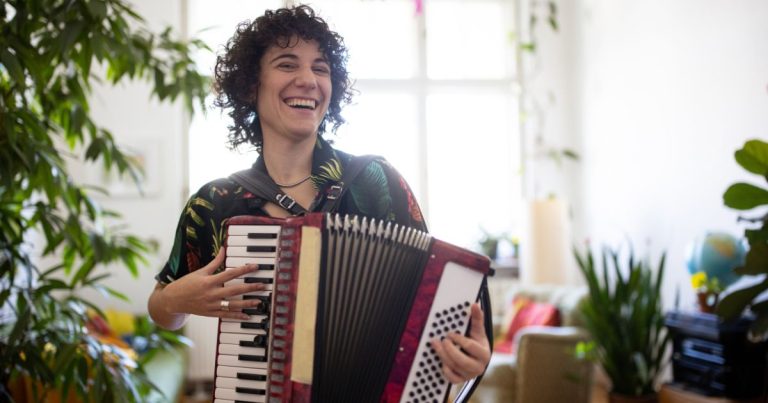Take a deep dive into the roots of folk music and discover how singers can get started with this enduring genre.
Can music change the world? Lovers of folk music certainly think so.
Over the centuries, folk music has given a voice to the working classes and activists.
As folk singer-songwriter Woody Guthrie put it, “It’s a folk singer’s job to comfort disturbed people and to disturb comfortable people.”
To learn more about the genre, the Singing Teachers Talk podcast interviewed singer, teacher and dyed-in-the-wool folkie Anna Tabbush.
Here’s a taste of what she had to say.
What is Folk Music?
If I had to sum up folk music in one word, I would say ‘stories’.
Every culture around the world has its own music to tell stories.
Folk songs can mark celebrations, get people dancing, or express love or loss, and they are often handed down from generation to generation.
Folk music can also serve as ‘work music’. Traditionally, sailors, weavers and farmers have sung folk songs while performing (often repetitive) tasks.
For this reason, folk music is rooted in the working class experience. Often, folk songs draw attention to social issues or take inspiration from nature.
What Are The Best Known Examples of Folk Music?
Most people are familiar with at least a few traditional folk songs, such as common nursery rhymes (Ring a Ring o’ Roses) or sea shanties (What Shall We Do With The Drunken Sailor?).
Popular folk artists include Joni Mitchell, Bob Dylan, Sandy Denny, Ben & Dom and Jackie Oates.
What Are The Main Principles Of Folk?
A folk song stands alone and tells its own story musically and lyrically.
Its structure is generally simple. You either have a set of verses, and every verse will have the same melody, or you have verse, chorus, verse, chorus.
It’s not always easy to distinguish the difference between a pop tune and a folk song as they can have a similar structure.
But if I were writing a pop song, it would be more rhythmic. It would have a catchier melody with different sections, more chordal movement and music informed by the accompaniment.
Whereas if I were writing a folk song, it would stand alone as a vocal line. I could sing it a cappella with or without other people singing in harmony.
Instrumental Accompaniment
Folk bands tend to have more treble-heavy instruments that sit in the same sort of pitch as the vocal and may include fiddles, melodeons and accordions and sometimes whistles.
What Vocal Qualities Are Needed to Sing Folk?
With folk, the emphasis is always on singing with your individual voice. The important thing is to sing as if you’re telling a story.
You use your voice without too much affectation. The aim is to communicate a song, not showcase your voice.
That’s an important distinction to make – in fact, it’s almost a definition of folk music; the performance is about the song, not the singer.
The important thing about folk is that there’s something for everybody.
As many songs were written to be sung by workers, you don’t need a big range.
How Has Folk Music Evolved Over Time?
With more traditional folk, the singer’s voice had to fill a space. Often, this meant standing up in a crowded pub and making everybody fall silent by having a tone you can hear on the other side of the room.
But since we’ve been able to use amplification to balance the voice against other instruments, the sounds in folk music have become more complicated.
Modern folk artists sometimes use softer or breathier vocals when singing with amplification at a music venue or in a recording studio.
How to Get Started Singing Folk
The key to singing folk is to tell a story using your authentic voice.
It’s important to relax and be free of tension. If you’re worrying about hitting a particular note there will be a separation between what you’re trying to deliver and what the audience is receiving.
You want to connect with the audience so that they see the same story that you’re seeing in your mind.
To develop confidence, I recommend people sing in community choirs or at open mic nights.
I also recommend people watch lots of other folk singers, not to imitate them but just to get a better understanding.
Learn more
Listen to the full interview with Anna on the Singing Teachers Talk podcast.
Image credit: Canva
.




